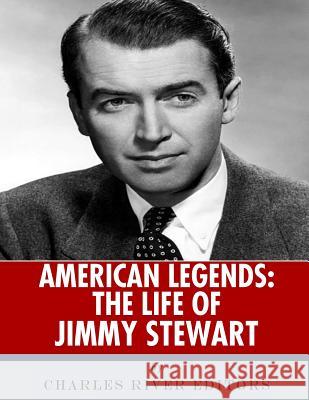American Legends: The Life of Jimmy Stewart » książka
American Legends: The Life of Jimmy Stewart
ISBN-13: 9781542751933 / Angielski / Miękka / 2017 / 50 str.
American Legends: The Life of Jimmy Stewart
ISBN-13: 9781542751933 / Angielski / Miękka / 2017 / 50 str.
(netto: 42,93 VAT: 5%)
Najniższa cena z 30 dni: 44,46
ok. 16-18 dni roboczych.
Darmowa dostawa!
*Includes pictures.
*Includes a bibliography for further reading. *Includes a table of contents.
"A feller came up to me the other day and said 'I don't know whether this means anything to you but you've given me and my family a lot of enjoyment over the years.' And I said to him, 'Does it mean anything to me? It means everything to me. That's the ballgame. That's it.' And I think that if I have done that to that man, and maybe a couple more...then I'm proud of that." - Jimmy Stewart
A lot of ink has been spilled covering the lives of history's most influential figures, but how much of the forest is lost for the trees? In Charles River Editors' American Legends series, readers can get caught up to speed on the lives of America's most important men and women in the time it takes to finish a commute, while learning interesting facts long forgotten or never known.
When the American Film Institute assembled its top 100 actors of all time at the close of the 20th century, Jimmy Stewart ranked third, behind only Humphrey Bogart and Cary Grant. There is a certain inevitability to these three actors ranking at the top of the list; after all, they were the dominant faces of Hollywood during the height of the era known as classical Hollywood cinema, a time before the onset of television when the movies still enjoyed relatively uncontested supremacy over American entertainment. The popularity of Stewart, Grant, and Bogart also extends well beyond the success of any of their individual films, reflecting their much broader cultural significance as monuments of Hollywood during its Golden Age.
In fact, if the list was reconstructed today, it is entirely possible that Stewart would rank first. Not only have movies such as It's a Wonderful Life (1946) and Vertigo (1958) continued to gain in popularity even into the 21st century, but Stewart has come to embody an accessible image of American values that is easy for everyone to embrace. The wholesome, happy-go-lucky persona he cultivated represents perhaps a more palatable image of American masculinity than the gritty realism of Bogart or the erudite but occasionally snobbish tendencies of Cary Grant. If there is any actor that embodies not only classical Hollywood but also American culture more generally, it's difficult to argue against Jimmy Stewart.
The phenomenon of Jimmy Stewart becomes even more remarkable when considering the incredible harmony between the characters he portrayed in his films and his personality off the movie set. Most actors and actresses cultivate a persona in order to achieve success, and in most cases it's an image that bears only a tangential relationship to an actor's true personality, but there was no such division for Stewart. The all-American image conveyed in films such as Mr. Smith Goes to Washington (1939) and It's a Wonderful Life corresponds seamlessly with Stewart's off-screen pursuits, which included a degree in architecture from Princeton and an extended tenure as a pilot during World War II. There were elements of his life story that resisted cultural norms - he waited until age 41 before marrying, and his very decision to pursue acting in 1930s America could be seen as a deviation from more characteristically masculine professions - but there was an almost seamless congruence between the Stewart that audiences saw on screen and the man he was in real life. Naturally, his defining traits developed out of and in response to the values instilled in him by his family and cultural background, and for this reason, examining his filmography alongside his life story paints a complete picture of the delicate unity of Jimmy Stewart's life.
American Legends: The Life of Jimmy Stewart examines the life and career of one of Hollywood's most iconic actors. Along with pictures of important people, places, and events, you will learn about Jimmy Stewart like never before, in no time at all.
Zawartość książki może nie spełniać oczekiwań – reklamacje nie obejmują treści, która mogła nie być redakcyjnie ani merytorycznie opracowana.











